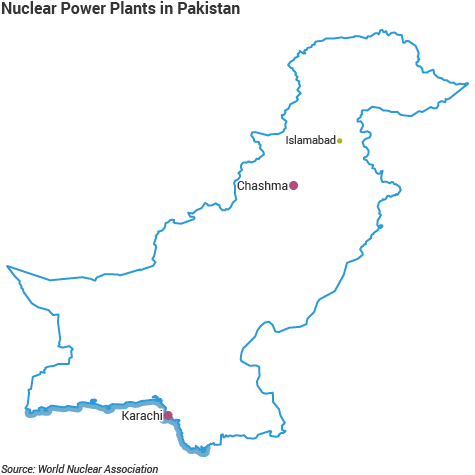International Atomic Energy Agency (IAEA) has approved the Pakistani plan submitted for the safeguarding of its Nuclear Power Plants near Karachi.
The K-2 and K-3 nuclear reactors of Pakistan, near Karachi, are being built with the help of China. The China National Nuclear Corporation (CNNC), is helping with this project and its design is based on Hualong One, which is CNNC’s third generation nuclear reactor design.
The cost of this project has been estimated to $10 billion by World Nuclear Association.
Yesterday, the International Atomic Energy Agency (IAEA), approved Pakistan’s application for safeguards of the power plant,
read more: Why is Nawaz government hinting at curtailing nuclear power production program.
Foreign Office said in a statement, “Pakistan has the rare distinction of keeping all its civilian nuclear facilities under IAEA Safeguards, signifying its commitment to global objectives of non-proliferation.” They also mentioned that these plants will help overcome the growing need of power and energy in Pakistan.
Pakistan has the distinction of keeping its nuclear facilities safe and avoiding routine breakdowns. India, in recent years, has experienced many accidents at its nuclear facilities.
“Civil nuclear power generation is an important component of Pakistan’s energy security policy and a vital developmental imperative,” remarked Nafees Zakaria, Foreign Office spokesperson.
read more: Why Pakistan’s energy policy will create an environmental hazard?
Pakistan has the distinction of keeping its nuclear facilities safe and avoiding routine breakdowns. India, in recent years, has experienced many accidents at its nuclear facilities.
These nuclear power plants are pressurized water reactors installed in Karachi, with the capacity to generate 1,100 megawatt of power from each plant. The inauguration of this project was done by Nawaz Sharif, Prime Minister of Pakistan, in November 2015. However, this project has been under limelight of the media and civil society organizations for some time. Biggest concern being its closeness to the city.
Nonetheless, these concerns were clarified by Dr Ansar Parvez, former Chairperson of the Pakistan Atomic Energy and advisor to National Command Authority. He clarified, through scientific evidence, that fear of radiation hazard due to these plant is baseless and the location fulfills the international standards of distance between nuclear plant and closest population.
read more: Is Pakistan making a conscious choice: removing energy crisis vs environmental…
Further, he added, this plant will detoxify 10 million gallons of water every day, which will also resolve the issue of clean water for the residents of Karachi.














